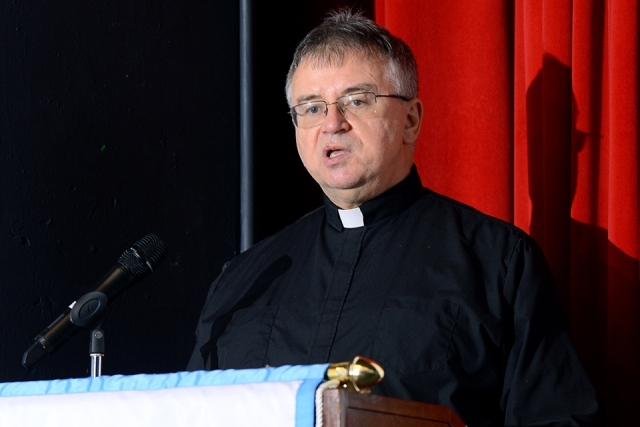
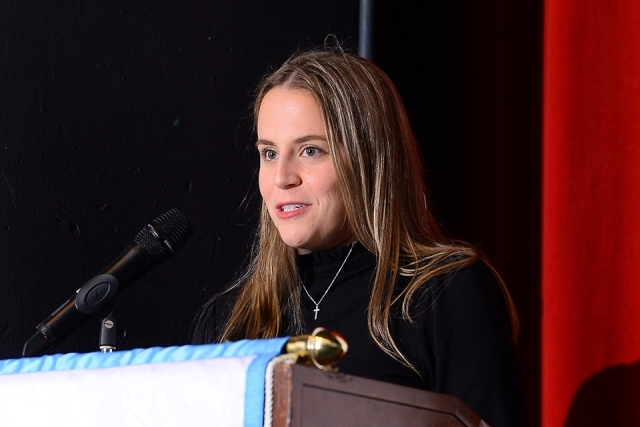
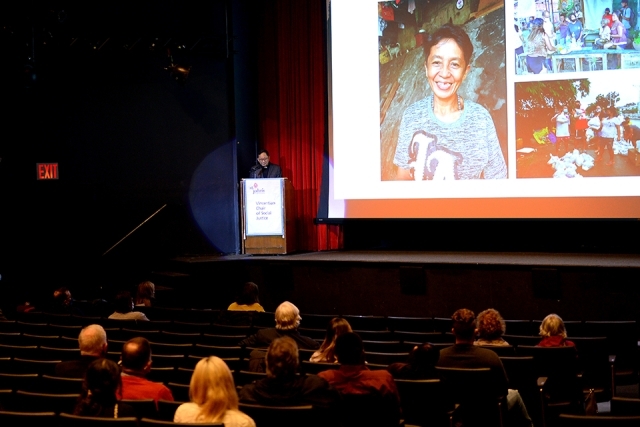
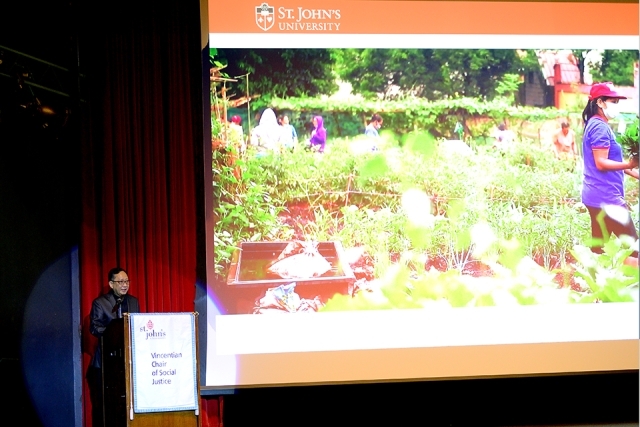
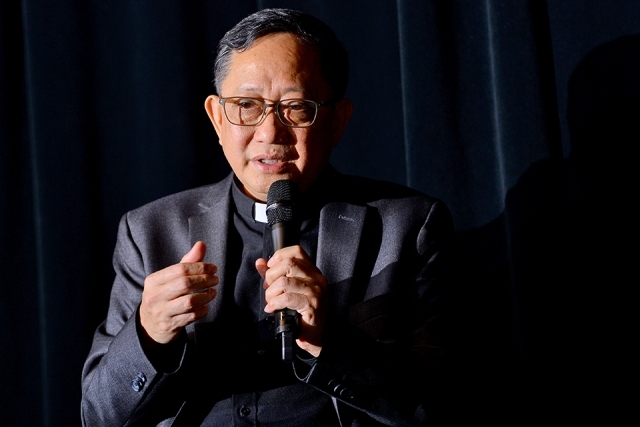
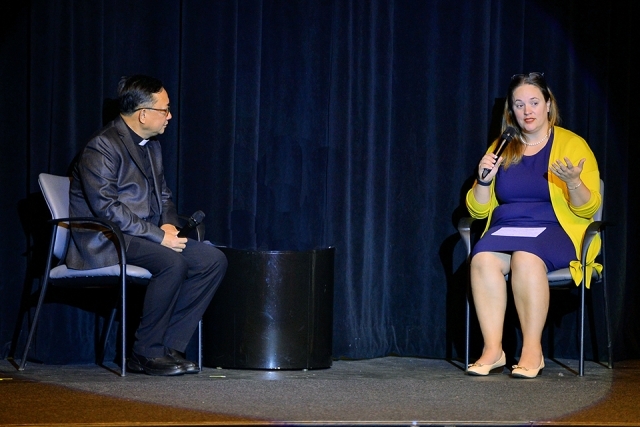






Hunger, a persistent concern in the Philippines, has become exponentially worse in the face of COVID-19—but a group of women in the small village of Payatas continue to make a difference.
That was the message of Rev. Daniel Franklin Pilario, C.M., Ph.D., S.T.D., this year’s holder of the St. John’s University Vincentian Chair of Social Justice, during his lecture, “Surviving the Pandemic: Solidarity in the Margins.” The event was held on December 6 in The Little Theatre on the Queens, NY, campus.
“Fr. Pilario expertly wove a tapestry that brought together the experience of COVID-19 upon his native Philippine population and his hearing of the Gospel,” noted Rev. Patrick J. Griffin, C.M., Executive Director, Vincentian Center for Church and Society.
Fr. Pilario said that after about eight months in lockdown, a group of women in Payatas began planting vegetables because their husbands were no longer working, and their families were hungry. “These women took over so that their families survived no matter what,” he stressed.
“They helped not because they belong to government agencies, political parties, or nongovernmental organizations,” he said. These formal institutions, he explained, were nowhere to be seen during the pandemic. “These women banded together because of their faith.”
He added, “It was the power of the poor, the power of the social movements on the ground. The poor know what to do. They know how to solve their problems, and they know only that they have no access to resources and opportunities. Given that access, they can lead the way.”
Fr. Pilario said that the voices of the poor have been silenced by global capitalism. They are considered “wasted capital” and have been quashed by governments. “In the Philippines, they are killed, literally and metaphorically.”
The poor also have been silenced by the Church, both in its organizational structure and in its theology, Fr. Pilario said. “Authoritative voices in the Church most often come from the center, not from the margins; from the clergy, not from the laity; from the men, not from women; from Rome and the West, not from Payatas. But, ironically, it is these muted voices that tell us of the way out of this pandemic darkness.”
Fr. Pilario told his audience that anyone who broke quarantine risked being shot. “I met a middle-aged father who told me: “They can imprison me if they want. I am not afraid, neither of the police nor COVID. What I am afraid of is when my small children die of hunger.”
In the parish where he worked, a program known as “Vincent Helps” was instituted in which three kilos of rice per family per week were distributed. “People lined up in the streets from early dawn to late at night just to get a meager food pack for their family.”
As a theologian, Fr. Pilario said he is gravely concerned about how the Church listens to the poor. “How does our theology of the Eucharist take into account this experience of hunger by millions of our people?”
Since Masses were not being celebrated, the local parish in Payatas became a packing center for food that was grown and was the center of the relief operation, Fr. Pilario explained. Some of these women-leaders were seniors, and many others had small children.
“After three months of relief distribution, we gathered to assess what we were doing. I asked, ‘After three months and with all of the risks involved, what made you stay? Why are you still here?’ Their response was, ‘In the Bible, Jesus asked us to feed the hungry. How can we stay safe at home when our neighbor is dying? How can we sleep when our neighbor is hungry?’”
Prior to the lecture, Fr. Pilario met with several Government and Politics majors in the D’Angelo Center for a more in-depth discussion of the topic, including how basic freedoms are being abridged in the Philippines under President Rodrigo Duterte. He noted that censorship is a major problem there, and the larger US television networks barely cover the situation.
Sophomore Nawshin Kamal, a native of Bangladesh, was impressed with Fr. Pilario’s advocacy and passion as he spoke about issues plaguing his home country. “He provided a really good contrast to what we have—and how we should be using these rights and freedoms to our advantage. My rights were not protected in my home country. This is one of the reasons I majored in Government and Politics—to understand what developing countries can do to improve their situation.”
Sana Farooqi, an English major who is minoring in Government and Politics, was not aware of the severity of the situation in the Philippines but drew parallels to her home country of Pakistan. “Censorship is bad, and it’s unsafe for women. These dictators and populist leaders use fearmongering to keep the population in line.”
Following the lecture, Fr. Pilario engaged in a question and answer session with Meghan J. Clark, Ph.D., Associate Professor, Theology and Religious Studies. “Fr. Pilario is one of the clearest and strongest—and at times poetic—as well as prophetic voices for the Gospel,” Dr. Clark said. “Americans,” she commented, “have been operating out of a mentality of scarcity during the pandemic when our reality is one of profound, and at times scandalous, abundance.”
Related News
Vincent’s Table Brings Dignity and Support to Students Facing Food Insecurity
Food insecurity among US college students is a rising problem. About 3.8 million college students experienced food insecurity in 2020 and it has only grown steadily worse.
Leading with Heart: Lucy A. Pesce Recognized for Changing Lives at St. John’s
Commitment to the Vincentian mission shone brightly last week when Lucy A. Pesce, Executive Director for Mission Initiatives at St. John’s University, was honored by Depaul USA with the Dax Champion Award for her unwavering leadership and compassion. Ms. Pesce’s recognition highlights not only her personal dedication but also the University’s broader mission to uplift and serve individuals experiencing homelessness.
Vocation Festival Showcases Diversity of Opportunities in Religious Life
Eager to help young people discern a call to religious service, representatives of 13 Catholic congregations gathered in the D’Angelo Center plaza for St. John’s University’s fourth annual Vocation Festival.
